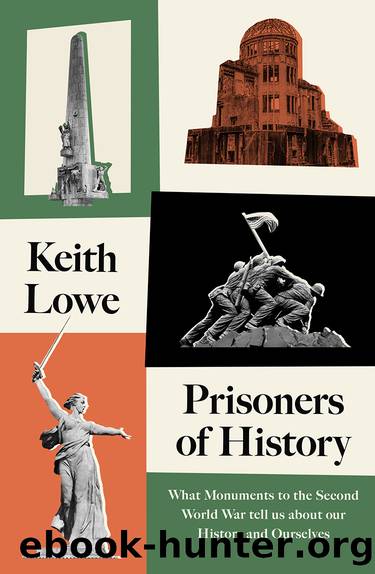Prisoners of History by Keith Lowe

Author:Keith Lowe [Lowe, Keith]
Language: eng
Format: epub
Publisher: HarperCollins Publishers
Published: 2020-03-27T17:00:00+00:00
14
Japan: Yasukuni Shrine, Tokyo
It is not only in Slovenia that the line between heroes, martyrs and monsters has become blurred. Many nations, including my own, shy away from looking too closely at some of their past deeds. This is simply human nature. Whenever it feels too difficult to draw a clear line between our guilty actions and our innocent ones, or when it risks making us too uncomfortable, every nation will take shelter in the grey areas between right and wrong.
Those grey areas are not there by chance. They provide a very useful function in society: they allow us to move towards the idea that we have done wrong, without forcing us to fully acknowledge our guilt. They are, in effect, a cushion which softens our fall.
Take for example the legacy of British colonialism. British people know, deep down, that the subjugation and exploitation of other nations was morally indefensible; but they salve their conscience with the thought that the empire also brought one or two benefits to Britain’s colonies, such as the railways, and cricket, and western-style education. ‘Perhaps we did wrong,’ they can tell themselves, ‘but we weren’t monsters.’
Some nations do not have that luxury. In 1945, Japan and Germany were defeated so comprehensively that they had no opportunity to construct their own narrative about the crimes they had committed during the war. At the Nuremberg and Tokyo trials, those crimes were laid bare for all to see. They included some of the worst possible violations of humanity: mass enslavement, mass rape, mass murder, genocide. Both regimes routinely worked their prisoners to death. Both conducted medical experiments on live human beings. There was no hiding from the fact that the people who committed these crimes did behave like monsters.
What does this do to a country? How do you come to terms with the idea that you belong to a nation of perpetrators? In such a context is it possible to mourn your dead? How can you honour military sacrifice without also excusing military crime?
These are the questions that faced Japan in the years after 1945, and have plagued it ever since. How to remember the war has become one of the most problematic issues in Japanese society. Some organisations have tackled the matter head on: they have embraced Japan’s guilt, tried to make amends, apologised. But one institution in particular has chosen a different path: that of denial. The Yasukuni Shrine in Tokyo has never accepted the version of history that every other nation accepts. It rejects the verdicts of the war crimes trials; indeed, it seems to reject any distinction at all between the innocent and the guilty. It has repeatedly tried to muddy the waters around the subject in an artificial attempt to recreate those moral grey areas that other nations are allowed to enjoy.
Unfortunately, things have not quite worked out like that. History is a prison that cannot be escaped. By trying to wriggle out of the country’s responsibilities towards the past, the priests in
Download
This site does not store any files on its server. We only index and link to content provided by other sites. Please contact the content providers to delete copyright contents if any and email us, we'll remove relevant links or contents immediately.
| Africa | Americas |
| Arctic & Antarctica | Asia |
| Australia & Oceania | Europe |
| Middle East | Russia |
| United States | World |
| Ancient Civilizations | Military |
| Historical Study & Educational Resources |
The Radium Girls by Kate Moore(12033)
100 Deadly Skills by Clint Emerson(4929)
Rise and Kill First by Ronen Bergman(4792)
The Templars by Dan Jones(4690)
The Doomsday Machine by Daniel Ellsberg(4492)
The Rape of Nanking by Iris Chang(4217)
Killing England by Bill O'Reilly(4006)
Stalin by Stephen Kotkin(3970)
Hitler in Los Angeles by Steven J. Ross(3947)
12 Strong by Doug Stanton(3553)
Hitler's Monsters by Eric Kurlander(3344)
Blood and Sand by Alex Von Tunzelmann(3206)
The Code Book by Simon Singh(3193)
Darkest Hour by Anthony McCarten(3134)
The Art of War Visualized by Jessica Hagy(3011)
Hitler's Flying Saucers: A Guide to German Flying Discs of the Second World War by Stevens Henry(2757)
Babylon's Ark by Lawrence Anthony(2683)
The Second World Wars by Victor Davis Hanson(2528)
Tobruk by Peter Fitzsimons(2520)
